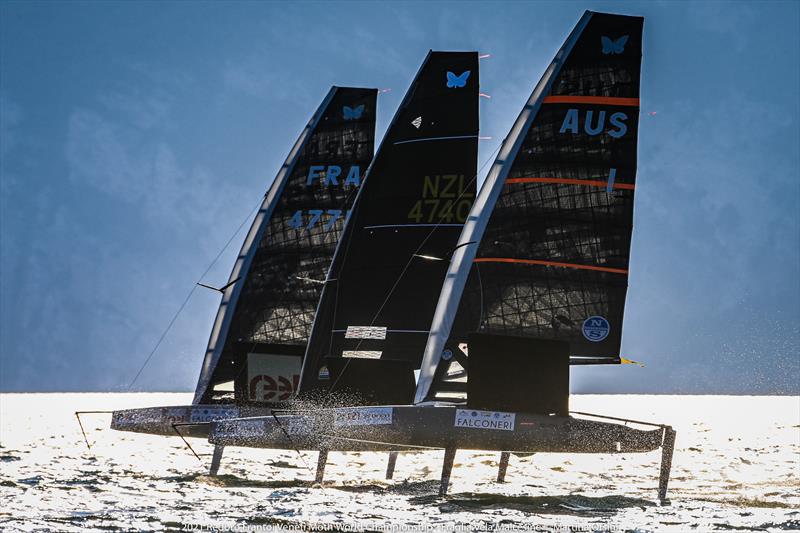
An interview with Robert Saylor on the 2022 Foiling Midwinters #2
by David Schmidt 9 Feb 2022 16:00 GMT
February 11-13, 2022

International Moth Worlds 2021 day 4 © Martina Orsini
Foiling. Even the word sounds cool, and that's to say nothing of the optics. There's no question that the level of play ratchets up several clicks when foils are involved, and an opportunity to get in some mid-winter flight time can pay dividends throughout the season (in addition to being a lot of fun). Enter the 2022 Foiling Midwinters #2 (February 11-13), which will take place on the waters of Buttonwood Sound, off of Key Largo, Florida.
As its moniker implies, (and as the NOR literally states), the regatta is open to: "the International Moth Class, the International Waszp Class, and foiling boats of the A-Class Catamaran Association." But, due to some scheduling conflicts, the February event will be fairly Moth-centric.
As its moniker also implies, this is the second of a multi-part series (this year's Foiling Midwinters #1 unfurled from January 7-9, while Foiling Midwinters #3 will take place from March 11-13), all of which are being organized by the Upper Keys Sailing Club (UKSC), as well as the US International Moth Class Association, the International Waszp Class Association, and the U.S. A-Class Catamaran Association.
I checked in with Robert Saylor, UKSC's fleet captain, to learn more about this high-flying regatta.
What kind of entry numbers are you seeing this year? Also, are there any notable geographical concentrations to this entry list?
We are looking for between 10 and 25 boats this year.
Unfortunately, travel complications are limiting involvement from international sailors, as well as those on the West Coast. We're expecting most sailors to be from the Northeast, with a few from the Midwest.
Weather-wise, what kind conditions can sailors expect to encounter off of Key Largo in mid-February? What are the best-case and worst-case weather scenarios?
During the winter and spring, we get 8 to 14 knot winds from the South-East. Every few weeks, a cold front comes in from the north and brings 20-knot winds.
Buttonwood Sound is very well sheltered, so the most extreme chop we get is only one foot or so. As long as we don't get a 25-knot northerly or a calm spell (which usually only lasts for a day), conditions ought to be consistent 10 to 14 knots with negligible wave action.
Do you see local knowledge playing a big or small role in the regatta's outcome? Can you please explain?
Local knowledge isn't too important here in Key Largo. It can be a little swirly at the windward mark depending on the wind direction, but otherwise we have no current, tides, or shallows to worry about.
How many races do you and the other organizers hope to score over the course of the regatta? Also, how are you guys managing the racecourse? Traditional racing marks, or will you use some of the new GPS-guided autonomous robotic marks such as MarkSetBots to administer the racecourse?
Our goal is 12 races, but of course this will be influenced by the conditions each day.
We'll have a traditional windward-leeward course set up, with a signal boat, mark boat, and two safety boats. I don't have any personal experience with autonomous marks, but they seem like an unnecessary complication for a club such as ours.
Obviously organizing and running a big regatta amidst a still-churning pandemic isn't easy. Can you tell us about the biggest logistical and organizational hurdles that you've had to clear to make this happen?
So far, the biggest obstacle we have had is getting accurate counts of interested sailors. For whatever reason, it has been harder to get sailors to register ahead of time this year. This has made it more difficult for us to make arrangements for storage, volunteers, food, etc.
Can you tell us about any efforts that you and the other regatta organizers have made to try to lower the regatta's environmental footprint or otherwise green-up the regatta?
Littering is protest-able, by anyone. On the water, our safety boats will be refilling competitors' individual water bottles in between races. We're also minimizing the use of disposable materials around the clubhouse, at least as much as Covid-19 concerns allow.
Is there anything else that you'd like to add, for the record?
I'm really looking forward to where the new developments in the Moth class are headed. Several new designs have been introduced in the past couple years, and this is the perfect opportunity to see some of these advancements in action.